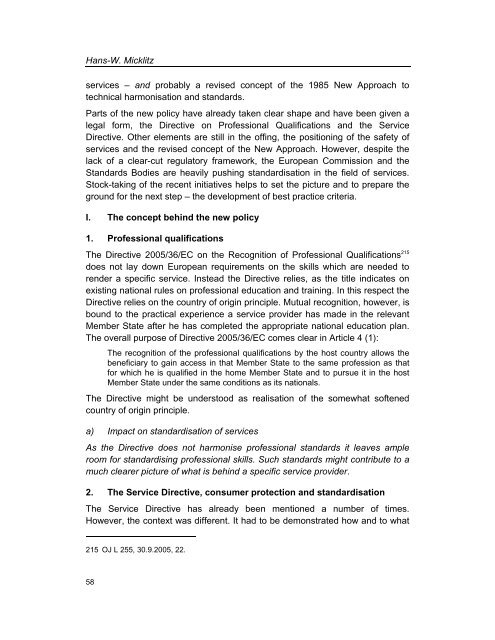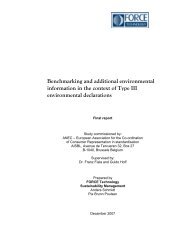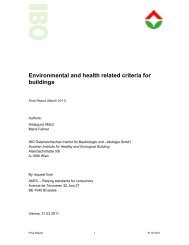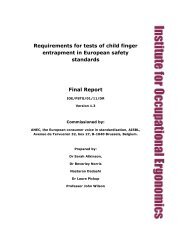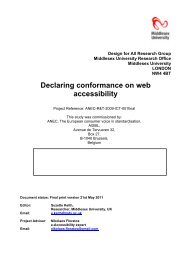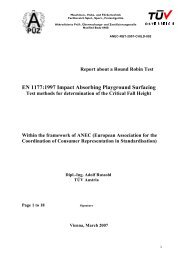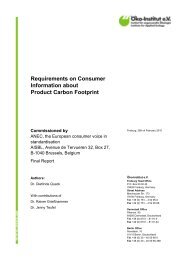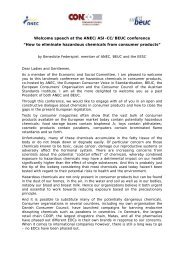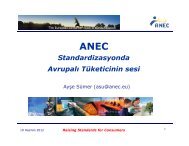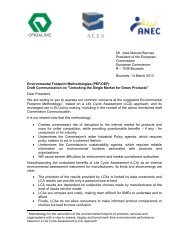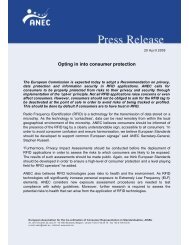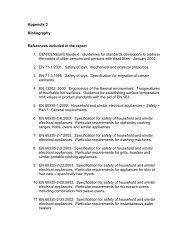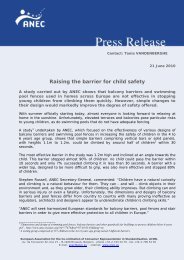Services Standards: Defining the Core Consumer Elements ... - ANEC
Services Standards: Defining the Core Consumer Elements ... - ANEC
Services Standards: Defining the Core Consumer Elements ... - ANEC
You also want an ePaper? Increase the reach of your titles
YUMPU automatically turns print PDFs into web optimized ePapers that Google loves.
Hans-W. Micklitz<br />
services – and probably a revised concept of <strong>the</strong> 1985 New Approach to<br />
technical harmonisation and standards.<br />
Parts of <strong>the</strong> new policy have already taken clear shape and have been given a<br />
legal form, <strong>the</strong> Directive on Professional Qualifications and <strong>the</strong> Service<br />
Directive. O<strong>the</strong>r elements are still in <strong>the</strong> offing, <strong>the</strong> positioning of <strong>the</strong> safety of<br />
services and <strong>the</strong> revised concept of <strong>the</strong> New Approach. However, despite <strong>the</strong><br />
lack of a clear-cut regulatory framework, <strong>the</strong> European Commission and <strong>the</strong><br />
<strong>Standards</strong> Bodies are heavily pushing standardisation in <strong>the</strong> field of services.<br />
Stock-taking of <strong>the</strong> recent initiatives helps to set <strong>the</strong> picture and to prepare <strong>the</strong><br />
ground for <strong>the</strong> next step – <strong>the</strong> development of best practice criteria.<br />
I. The concept behind <strong>the</strong> new policy<br />
1. Professional qualifications<br />
The Directive 2005/36/EC on <strong>the</strong> Recognition of Professional Qualifications 215<br />
does not lay down European requirements on <strong>the</strong> skills which are needed to<br />
render a specific service. Instead <strong>the</strong> Directive relies, as <strong>the</strong> title indicates on<br />
existing national rules on professional education and training. In this respect <strong>the</strong><br />
Directive relies on <strong>the</strong> country of origin principle. Mutual recognition, however, is<br />
bound to <strong>the</strong> practical experience a service provider has made in <strong>the</strong> relevant<br />
Member State after he has completed <strong>the</strong> appropriate national education plan.<br />
The overall purpose of Directive 2005/36/EC comes clear in Article 4 (1):<br />
The recognition of <strong>the</strong> professional qualifications by <strong>the</strong> host country allows <strong>the</strong><br />
beneficiary to gain access in that Member State to <strong>the</strong> same profession as that<br />
for which he is qualified in <strong>the</strong> home Member State and to pursue it in <strong>the</strong> host<br />
Member State under <strong>the</strong> same conditions as its nationals.<br />
The Directive might be understood as realisation of <strong>the</strong> somewhat softened<br />
country of origin principle.<br />
a) Impact on standardisation of services<br />
As <strong>the</strong> Directive does not harmonise professional standards it leaves ample<br />
room for standardising professional skills. Such standards might contribute to a<br />
much clearer picture of what is behind a specific service provider.<br />
2. The Service Directive, consumer protection and standardisation<br />
The Service Directive has already been mentioned a number of times.<br />
However, <strong>the</strong> context was different. It had to be demonstrated how and to what<br />
215 OJ L 255, 30.9.2005, 22.<br />
58


